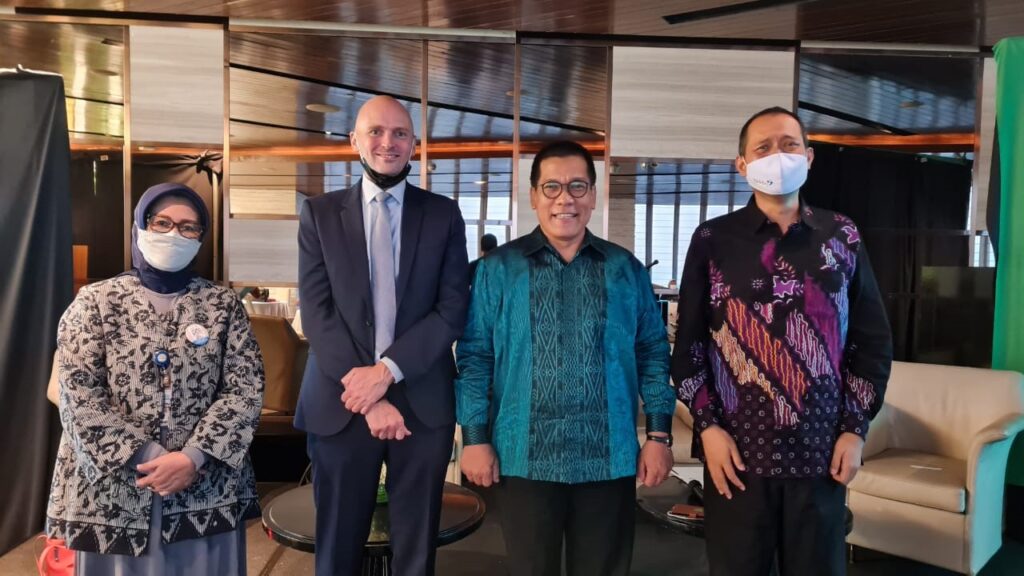BKKBN and the Embassy of Denmark to Indonesia Exploring Opportunities for Collaboration on Stunting Prevention through “Ambassador Talks”
The National Population and Family Planning Board of the Republic of Indonesia (NPFPB/BKKBN), Jakarta/21/04/2021– The Chairman of BKKBN Dr. Hasto Wardoyo, MD, OBGYN represented by the Deputy for Training, Research and Development Prof. Rizal Damanik, Ph.D., express his deepest gratitude to the guest of honor, Ms. Dewi Savitri Wahab, the Ambassador Extraordinary and Plenipotentiary of Indonesia and Mr. Soren Bindesboll, the Deputy Ambassador to Royal Danish to Indonesia for their support and participation in the “Ambassador Talks” event which themed “Approaches to Prevent Stunting from Different Perspective” at the Westin Hotel, South Jakarta, Indonesia.

On this occasion, Prof. Damanik explained, “Currently, Indonesia is striving for various issues especially in the health sector, including the acceleration of the stunting reduction. Based on the Global Nutrition Report (2018), the stunting prevalence in Indonesia is 108 out of 132 countries, which makes Indonesia the 2nd highest prevalence (after Cambodia) in the Southeast Asia Region”.
According to Indonesia Basic Health Research Data (Riskesdas), the stunting rate in Indonesia has decreased from 37.2% in 2013 to 30.18% by 2018. However, the prevalence is still relatively high if compared to the World Health Organization (WHO) standards, which is at 20%. Factors that contribute to stunting, are: 1) lack of nutritional intake; 2) recurrent or chronic infections; 3) poor sanitation; 4) limited health care services. Besides, other social, political, cultural, and economic factors also affect rates of stunting in Indonesia.
Prof. Damanik adds that the issue of stunting in Indonesia has become one of the national priorities stated in the Medium Term Development Agenda (RPJMN) 2020 – 2024. It emphasizes convergent policies to increase the access to and quality of specific and sensitive nutrition interventions. The focus of areas proliferates gradually reaching all cities/municipalities by 2024. It is a sector-wide approach involving 24 central government sectors, local governments, non-government organizations, private sectors, and others.
In January 2021, the National Population and Family Planning Board of the Republic of Indonesia (BKKBN) is mandated by the President of the Republic of Indonesia, H.E. Ir. Joko Widodo to lead the implementation of a stunting reduction program, which targeted to reduce the stunting rate from 27.6% to 14% by 2024. To achieve the target, Indonesia should reduce the stunting rate by 2.7% each year.
Various interventions for direct and indirect causes of stunting are also needed. The interventions for the direct causes include; 1) supplementary feeding for pregnant women and the poor; 2) iron supplement for pregnant women; 3) breastfeeding promotion and counseling; 4) Malnutrition management; 5) growth monitoring and promotion. Meanwhile, the interventions targeting indirect causes of stunting include; 1) improve the provision of drinking water supply and sanitation; 2) improve access and quality of nutrition and health services; 3) increase awareness, commitment, and parenting practices and nutrition of mothers and children; 4) increase access to nutritious food.
Prof. Damanik emphasized that the target would not be achieved without the help of various parties. Therefore, we need support and cooperation from multi-sectors and multi-parties to achieve this target and to improve the health of Indonesian society. Indonesia stands ready to work together on the above issues with all partners to reduce the stunting rate in Indonesia. One of them is cooperation with the Government of Denmark which aims to strengthen the collaboration between BKKBN and Denmark to develop cooperation to accelerate the stunting reduction and prevention program including the Family Development, Population, and Family Planning Program.

In addition, the Deputy for Population Management of BKKBN Dr. Ir. Dwi Listyawardani, M.Sc, Dip.Com added, “BKKBN also collaborates with Political Party Partners, which involves Commission IX where at the provincial level every private partnership activity in the province involves Parliament of Commission IX under their constituency and strives that each member Parliament of Commission IX gets their activity with partners or private sectors at least 1 activity”.
Dewi Savitri Wahab S.S. MA, the Ambassador Extraordinary and Plenipotentiary (LBBP) of the Republic of Indonesia to the Kingdom of Denmark and the Republic of Lithuania, which is domiciled in Copenhagen, also added that we must also be able to socialize in the provincial and grassroots level, such as how to provide health centers to be able to provide outreach to pregnant women with diabetes including diabetes in infants and toddlers which can also cause stunting. In this regard, providing knowledge on how to manage diabetes. This cooperation pattern can be used to reduce stunting and so that people can also understand what stunting is.”

On the same occasion Soren Bindesboll, the Deputy Ambassador of the Royal Danish to Indonesia added, “It is very important to socialize related nutritious foods with a balanced nutritional pattern. Denmark has undertaken programs that begin with caring for babies with a focus on the mother. The Danish Health Authority in collaboration with the Danish Veterinary and Food Administration has developed written guidelines that are facilitated for women to focus on the well-being of women before, during, and after childbirth,”said Soren.
*Jakarta/21/04/2021*
*Badan Kependudukan dan Keluarga Berencana Nasional (BKKBN)*